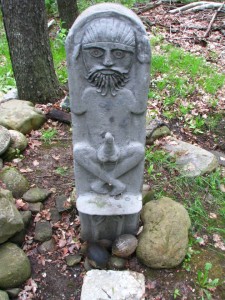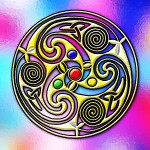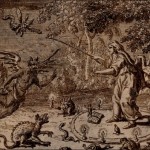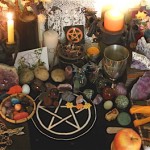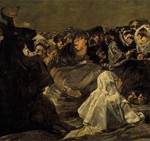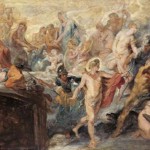Still working away not at the computer. I promise to show you all some of what I’m up to before I leave for Starwood. I hope you’re enjoying your summer.
Some of this is my fault. I mean this emphasis in the Pagan community, and especially in ADF, on ‘Patron’ deities in personal worship. The topic remains important and somewhat controversial in Euro-Pagan reinvention, arising in 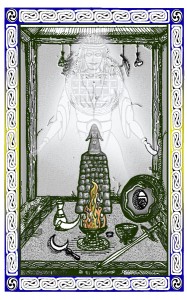 regular waves in public discussion.
regular waves in public discussion.
In my opinion the idea that individual practitioners have, or should have, ‘Patron’ deities enters Neo paganismfrom two or three directions. First, of course is the Euro-Christian custom of providing every believer with a Patron Saint upon baptism. This cannot be shown to have Pagan roots, but it has a firm grip on western imagination.
Secondly we have the Patronage practices of African Traditional Religions in the new world. Customs such as the Haitian Lave Tet and the Crowning of Santeria present the worshiper as being naturally and intrinsically aligned with one of the Powers of that system. In the course of early spiritual work the initiate determines, through divination and ritual, who is the ‘God of the Head’ and ritually acknowledge the relationship. That spirit then becomes the personal ‘god’ (fine points of Ifa theology aside) of the initiate’s work, even though s/he may interact with many other spirits.
As I think back to the early 1990s, as we were working on devising our new, more formal polytheism this notion of personal Patronage loomed large. One of the core problems in translating scholastic study of old religions into working modern cult is determining which of the innumerable Holy Beings is to receive ones real attention. We approach an ethnic pantheon, do our reading, and begin offerings. Fortunately, in ADF our ‘Druidic’ ritual order begins with general offerings to all beings in all classes, so one can get a foot in the temple door without a specific invitation.
The ancients must have had this problem as well, and we can ask how they solved it. Focus on specific deities seems to have come from several directions – perhaps especially from family and caste, from profession, and from locale. All of these can provide some guidance for modern choices, though we are disadvantaged by our non-Pagan surrounding culture. Most modern Pagans will not inherit our family’s gods, nor have local deities whose festivals are community norms. Not Pagan ones, anyway… We can still take some guidance from our career and artistic choices in life and many Pagans do so.
Back when we were starting out, I fixated pretty firmly on the idea of ‘Patronage’ – that worshipers would choose or be chosen by (as you like…) a specific god who would become the god of their Altar, their House, their work. I experimented with the methods locally with some success, devised scripts and guidance materials, and it was included as a goal in the first version of ADF’s Dedicant Work.
Fairly enthusiastically received, within a couple of years problems with the model became obvious.
First, it became obvious that the methods were too advanced for new students. Many ADF students arrive entirely new to Paganism, meditation or ritual. The goal of decisively arriving at a Patronage relationship was a stumbling block, likely to produce either a withdrawal from the work or a provisional decision that had little of the weight of the model found in traditional systems. As a side note, continuing research didn’t turn up the idea of Patronage in literate pre-Christian Europe. The Orthodox Christian custom of affixing a saint’s name to believers does not appear to be inherited from Pagan times.
Some practitioners stuck with the model and, for a few, got the kind of results I might have imagined. They became real devotees of a particular deity. There’s been very little overt henotheism, I’m happy to say – little choice made to worship no other gods than the Patron. I would find that inconsistent with what I know of polytheistic religions generally. On a practical level the more common result was that individuals focused on specific deities sequentially, as their lives’ needs guided.
This seems typical of Neopaganism’s self-directed spiritualties. The big, big difference between us and the ATR systems I had been observing is the manner by which Patrons are chosen. In ATR systems it is done by an external authority – by the divinations of a priest. The decision is binding on the initiate regardless of how s/he “feels” about the outcome. I understand that changes and corrections are not unheard-of, but in general the fact of Patronage is bestowed, not chosen.
I know of no Neopagan system that is ready to administer such a thing. The ATR divination systems are all adapted for it – they generate indicators of the various gods and spirits as a matter of course. There simply is no such system in western occultism or Paganism. Even more centrally there is no accepted lineage or source of authority that would make people willing to accept the decision of another.
After maybe half-a-dozen years of working with the original model ADF formally changed the nature of the requirement. Instead of prescribing Patronage we began to talk of “developing the Hearth Cult”. This helped us to move the conception beyond deity – traditional Paganism seems as much focused on the Dead and on the Landwights as on the Gods and Goddesses. The recommended practices expanded to include the Three Kindreds broadly, and the requirement to have an acknowledged Patron was removed.
As I have observed, this history in ADF rather mirrors the development of the idea of Patronage in the wider Pagan community. At present the idea still exists, and there will always be people who are plainly drawn to one god or another. There is a real movement of Pagan devotionalism, and some folks become henotheists – worshiping only ‘their’ god or goddess to the exclusion of others. Currently, my opinion is that such exclusivity does not reflect the practices of most traditional polytheism.
Tradition seems, to me, to recommend a balance of intimacy and utilitarianism. One develops alliances and friendships among the spirits over long or focused work. One’s ‘Home Cult’ is a unique print of one’s spiritual history and expression. Many people maintain a central relationship with a very few gods and spirits for many years. However for new students there is often a period of transition, and a sense of being ‘handed off’ from god to god. No formal methods of securing Patronage have become generally accepted in modern polytheism, and no divinatory method or priestly authority has shown up, either.
Yet the subject of Patronage continues to percolate. New students, especially those looking to modern polytheism rather than post-Wicca, tend to bring the question “How shall I find my Patron?”, and some degree of confusion still exists. Of course many new students arrive out of religious systems with actual rules, and so they may stand staring at the notion that they’re free to do as they please. From there we hope to provide some guidance in sorting the spirits (and helping them sort us).
When I give advice to new students now, it goes something like this:
• Your path is your own, but progress is more easily made on paths with good signage. Choose a system and work it for a year at least, preferably three. It will adapt as you go, but start with an outline.
• Choose one or two ancient cultures on which to focus your reading and experimentation. Begin, perhaps, with the descriptions of the gods in mythic summaries, but make an effort to read about the ancient ways of life, hear the culture’s music, etc.
• Put up a shrine and begin worship. The spirits are unlikely to speak to you unless you speak to them first. There are many places to find instructions on how to begin. If one is unsure of who one is offering to, there are several models for general offerings, including Our Druidry’s Three Kindreds, and Jason Miller’s spirit-offering outlines.
• Open your heart. Some of the discernment exercises in places like ADF’s Dedicant’s book may be useful. Work on meditation skills and let the ideas of your reading and shrine-work percolate. Not everyone (but some) will naturally turn toward a specific god quickly. Place as many gods from the culture you’re working with on your shrine as you like, and work with them as you study.
• If you find yourself with an obvious inclination toward a god or spirit, go with it. Resist exclusivity but allow emphasis, and watch your heart and the omens. Use divination, or even consult a diviner.
• Don’t resist change, but don’t mistake momentary interest for a calling. Once you have established work with an ally, maintain it even if you take up something new, all according to your own understanding, of course.
• After a year or three of this kind of work it is likely that you’ll have a sense of what gods are at the center of your personal Constellation of Worship. After another nine years things may or may not be different. Don’t sweat it, our work changes shape like a stream-bank. You’ve watched a stream-bank, haven’t you?
It pleases me that practical polytheism is percolating in our (people… no! too much…) community. New students are seeking direct interaction with the deities, and even with the Not-Gods. Even more hopeful is that fact that Neopagan religions are trying on various approaches experimentally, and then changing and responding to the results of those experiments.On we go, my kin! Raise up the idols
!
